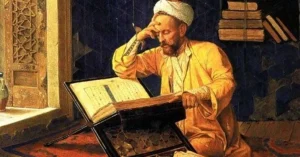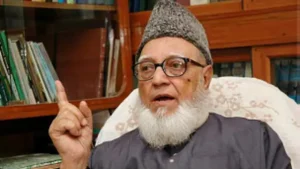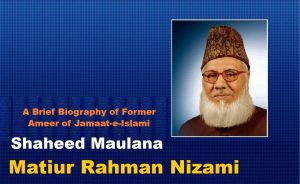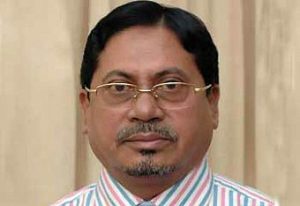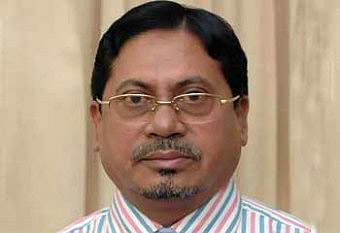
Mohammad Kamaruzzaman
A Life of Simplicity and Transparency
Despite holding high-ranking positions in Jamaat-e-Islami, including Assistant Secretary General, Kamaruzzaman never pursued personal wealth or privilege. He lived modestly, traveled simply, and saw leadership as a trust, not a path to wealth.
Party workers and journalists said Kamaruzzaman never used his position for personal gain or exploited resources. His financial dealings were clean and auditable, setting an example within a political environment often tainted by corruption.
An Anecdote of Unshakable Honesty
As editor, Kamaruzzaman refused a donation linked to a hidden political agenda despite financial struggles.
“Truth cannot be bought, and we do not rent our pens for favors.”
This silent decision showed his strong ethics and commitment to honest journalism.
In Leadership: Accountability First
Even as a top leader, Kamaruzzaman held himself accountable. Within the organization, he regularly submitted personal expense reports, insisted on transparent budgeting, and discouraged blind loyalty. He once told a gathering of student leaders:
“If I ever deviate from the truth, you must correct me—not praise me.”
His rare honesty inspired many young activists to live with integrity and serve others.
In Prison: Dignity without Deception
During his imprisonment, Kamaruzzaman had every opportunity to plea for clemency, admit guilt, or seek political compromise. But he chose truth over life, rejecting even the suggestion of a mercy petition to the president. He famously said to his family:
“If I lie once to save my life, I will lose everything I ever stood for.”
Even under psychological pressure, complete isolation, and the looming shadow of death, his commitment to honesty never wavered. Prison guards noted he calmly faced injustice and never asked for special privileges—not even a fan in summer
Final Days and Martyrdom
Shahid Muhammad Kamaruzzaman Khan’s final chapter was written with courage, patience, and sacrifice. His last days and embrace of death showed unwavering faith and truth. Far from despairing in the face of injustice, he faced his impending martyrdom with remarkable serenity and spiritual strength.
The Calm Before the End
After the Supreme Court of Bangladesh upheld the death sentence in November 2014, the countdown to Kamaruzzaman’s execution began. However, he remained composed, committed to his principles, and spiritually connected to his Creator. Jail officials noted he was at peace, spending hours in prayer, Qur’an recitation, and reflection.
He refused to show signs of fear or desperation. When asked whether he would seek a presidential pardon, he firmly declined, saying:
“To seek clemency would mean admitting guilt. I will never confess to a crime I did not commit.”
His dignity surprised prison officials, who said they had never seen such steadfastness in a condemned man.
Farewell to Family and Followers
In his final meeting, Kamaruzzaman warmly embraced his family, urging them to stay strong and uphold the truth. He showed no sorrow, only hope and faith. During his final moments, he neither wept nor showed anguish. Instead, he remained composed and, moreover, offered words filled with hope, encouragement, and faith. As a result, his calmness deeply moved those around him.
Read the biography of Delwar Hossain Sayedee >>>
He reportedly told his sons:
“Never lower your head in shame. I am innocent in the eyes of Allah. My death is not defeat; it is my greatest victory.”
These words inspired many to see his life as a model of courage against tyranny.
The Execution Night: April 11, 2015
“On April 11, 2015, around 10:30 PM, prison authorities executed Muhammad Kamaruzzaman by hanging at Dhaka Central Jail. He spent his final moments in prayer, repeatedly reciting the Shahada: ‘La ilaha illallah, Muhammadur Rasulullah.”
A prison guard later described the scene as one of dignity and awe. In contrast to many inmates who trembled before the gallows, Kamaruzzaman reportedly walked to his death calmly and smiling. Moreover, his composure left a lasting impression on those present, reinforcing his legacy of courage and faith.
National and International Reaction
News of his execution drew a wave of grief, anger, and reflection across Bangladesh and beyond.
- In Bangladesh, millions silently mourned, with funeral prayers in absentia held in mosques, fields, and community centers.
- Islamic organizations across the globe released statements honoring his sacrifice and questioning the fairness of the judicial process.
- Prominent scholars and activists called his death a judicial martyrdom, comparing him to others who died for justice
In the aftermath of his execution, many observers, both at home and abroad, began to reflect deeply. Consequently, a critical question emerged: Was this truly justice, or rather, vengeance masked in legal form? Furthermore, the controversy surrounding the trial only fueled doubts about its fairness.
Conclusion: A Life Fulfilled in Death
Shahid Muhammad Kamaruzzaman’s final days reflected the life he always lived: truthful, unshaken, and devoted to his cause. He did not die in fear—he died in faith. In a world where many compromise for survival, he chose to sacrifice for his principles. His life was silenced by a rope, but his example continues to speak—loudly, courageously, and eternally.

